“EACH COUNTRY HAS ITS OWN RULES.” Notes by Khovar Editor Regarding Radio Ozodi President’s Letter to Tajik Foreign Minister
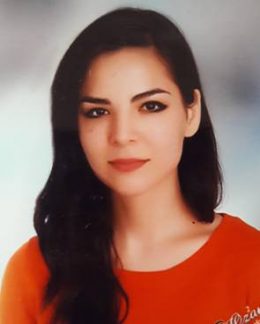
DUSHANBE, 06.04.2020. (NIAT Khovar) – The President of Radio Free Europe/Radio Liberty (Radio Ozodi) Jamie Fly is accusing the Tajik government of unfairness. “Tajik authorities continue to disrespect Radio Ozodi’s independence and are attempting to interfere with its operation,” he writes in his open letter to the Minister of Foreign Affairs of Tajikistan Sirojiddin Muhriddin, published on March 30th.
“The pandemic may threaten the country’s public health and national security,” he says, while complaining about what he sees as the government’s unwillingness to accommodate Radio Ozodi’s aims of reporting on the coronavirus. The key word here is “may.” Many scenarios “may” be. Considering that there are no registered cases in Tajikistan as of now, as was also officially confirmed by the head of the WHO Representative Office in Tajikistan Galina Perfilieva in her interview with Tojikiston TV, Radio Ozodi’s speculations which attempt to stir panic cause actual harm.
Considering that the government seeks to reduce the panic about the virus, and Radio Ozodi seems to seek the opposite, it is fair to say that Fly’s words could very well be about the news outlet itself. It seems to be attempting to interfere with the government’s goals, independence and operations.
A recent report about the death of a 60-year-old patient in the Jabbor Rasulov District hospital, which was published on April 5th on Radio Ozodi’s website, confirms the fact that by spreading incomplete and unverified information, its correspondents are sowing the seeds of panic among the country’s residents.
Fly writes that “the incomplete accreditation of Radio Ozodi journalists demonstrates the insincerity of your government in allowing journalists to work.” However, as early as December 10th of last year, at a press conference in Brussels, Muhriddin had clearly answered the questions concerning the reasons for the difficulties of obtaining accreditation for Radio Ozodi journalists. One of the reasons being the importance of security, especially considering Tajikistan’s recent history and proximity to Afghanistan.
“We border Afghanistan, where many threats come from. You also know that during the short period of our independence we survived a civil war. There are many other factors that threaten security and stability of the country. Therefore, the role of the media in the country is very important, and journalists and media representatives should carry out their activities within the framework of existing national legislation,” said Muhriddin.
“In October, we extended accreditation to seven Radio Ozodi journalists and technical staff. Why did it take so long? Because the situation in the country is like that. Each country has its own rules,” Muhriddin added.
While in the United State, foreigners and foreign media representatives are expected to operate by US rules and laws. Everyone is equal before the law in the US, and this is always proudly stated by its representatives. However, as things stand, in the course of their activities in Tajikistan, Radio Ozodi journalists seem to be seeking to bypass the laws of the host country.
Radio Ozodi would do well to steer its alleged «critical role» away from creating the illusion that developing countries are in need of guidance from the “big brother,” that is, developed countriesand their news outlets, toward its native country’s problems. Each country, indeed, has its own rules, and the head of a media corporation, even of a great power, cannot dictate his rules to the Foriegn Minister of an independent country.
Continuing with the letter, Fly turns his attention to the banned in Tajikistan Islamic Renaissance Party (IRP). Radio Ozodi will continue to give it voice and exposure, because IRP’s designation as a terrorist group is “contrary to international consensus,” he says. However, it is worth noting that not all terrorist groups bear the termor have international consensus.
The list of terrorist organizations includes those that are recognized as terrorist by at least one state or international organization in accordance with the regulatory legal acts of the given state or organization. It should be borne in mind that many organizations recognized as terrorist by some states deny the use of terrorist tactics to achieve their goals. In addition, there is no single, universally accepted definition of the concept of “terrorism” in international practice.
As a person who has lived in the US for over 20 years, I can cite as an example a local group that for over a century has been committing atrocities geared toward inducing terror among the public, especially in the African American community. Up until 1970s, the group’s modus operandi included lynching by stoning and hanging, sometimes incinerating their victims in their own yards. The Ku Klux Klan (KKK) formed in the 1860s and is the largest and most violent domestic terrorist organization in the US.
However, the KKK did not bear the designation “terrorist” then, nor does it now. It is curious to know how willing or objective Fly would be were he to interview with the head of the Klan during its height, and would he be ready to give the group the attention they crave in the media outlet that he heads? Would he be as sympathetic toward them just because the group is not considered “terrorist” by international consensus? Especially considering the fact that the Klan is also “an element of [US] life.”
Radio Ozodi indeed seeks to “play a critical role,” but contrary to Fly’s self-aggrandizing assumption, it is not needed at all. As many YouTube channels with many more subscribers than it will show, their numbers rise from sensationalizing and shocking the public than any attempt to do actual good to society,-whether to a foreign one or their own.
Shoguna SOBIR,
Editor of Khovar’s English News Service











 Lonely Planet Includes Tajikistan among the World’s Best Travel Experiences
Lonely Planet Includes Tajikistan among the World’s Best Travel Experiences Emomali Rahmon and Xi Jinping Highlight Significance of Launching Direct Passenger Flights between Dushanbe and Beijing
Emomali Rahmon and Xi Jinping Highlight Significance of Launching Direct Passenger Flights between Dushanbe and Beijing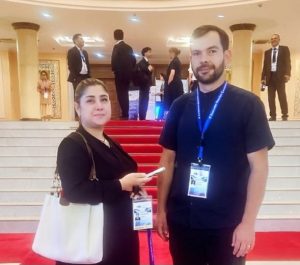 Tajikistan Provides Key Platform for Science–Policy Dialogue on Glacier Preservation, Says UCA Researcher
Tajikistan Provides Key Platform for Science–Policy Dialogue on Glacier Preservation, Says UCA Researcher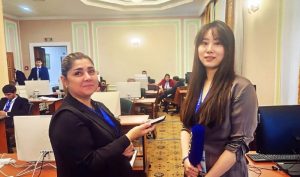 CGTN Journalist Praises Tajikistan’s Leadership on Glaciers’ Issues and Highlights China-Tajikistan Cooperation
CGTN Journalist Praises Tajikistan’s Leadership on Glaciers’ Issues and Highlights China-Tajikistan Cooperation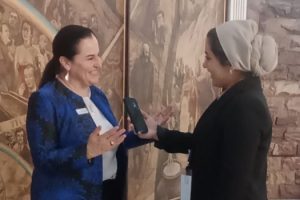 UN Women Official Stresses the Role of Women in Climate Action at Glaciers’ Conference in Dushanbe
UN Women Official Stresses the Role of Women in Climate Action at Glaciers’ Conference in Dushanbe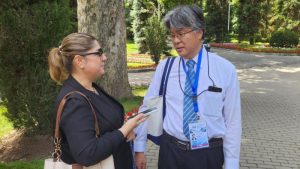 Japanese Researcher Highlights Tajikistan’s Role in Regional Water Security at High-Level Glaciers’ Conference
Japanese Researcher Highlights Tajikistan’s Role in Regional Water Security at High-Level Glaciers’ Conference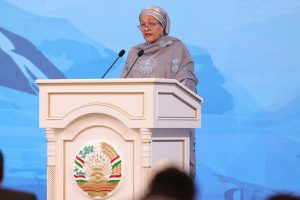 “This is Not Just Ice – This is Life”: UN Deputy Chief Calls for Urgent Action at Glaciers Conference in Dushanbe
“This is Not Just Ice – This is Life”: UN Deputy Chief Calls for Urgent Action at Glaciers Conference in Dushanbe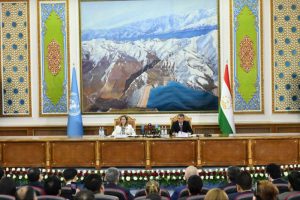 Dushanbe Hosts Landmark International High-Level Conference on Glaciers’ Preservation
Dushanbe Hosts Landmark International High-Level Conference on Glaciers’ Preservation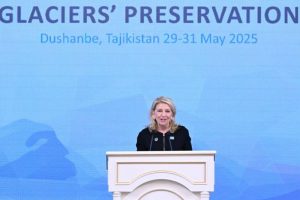 The Climate Crisis Is Primarily a Crisis of Children’s Rights
The Climate Crisis Is Primarily a Crisis of Children’s Rights Chinese Scientist Highlights Glacier Retreat as a Tangible Reality for Tajikistan, the Region, and the World
Chinese Scientist Highlights Glacier Retreat as a Tangible Reality for Tajikistan, the Region, and the World Dushanbe Conference Launches New Era in Global Glacier Diplomacy
Dushanbe Conference Launches New Era in Global Glacier Diplomacy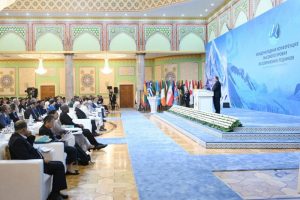 Global Leaders Urged to Fund UN Trust for Glacier Preservation
Global Leaders Urged to Fund UN Trust for Glacier Preservation














